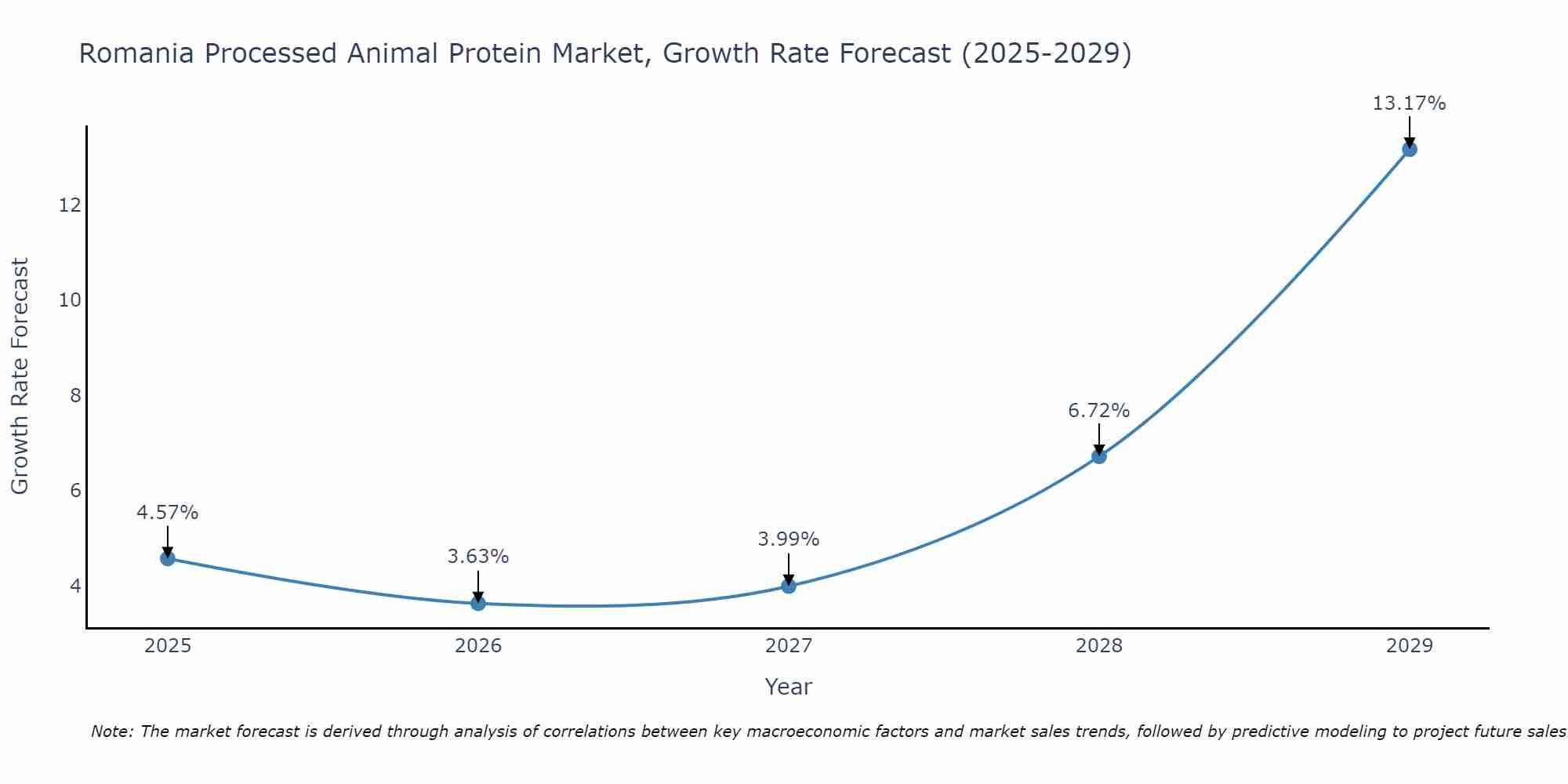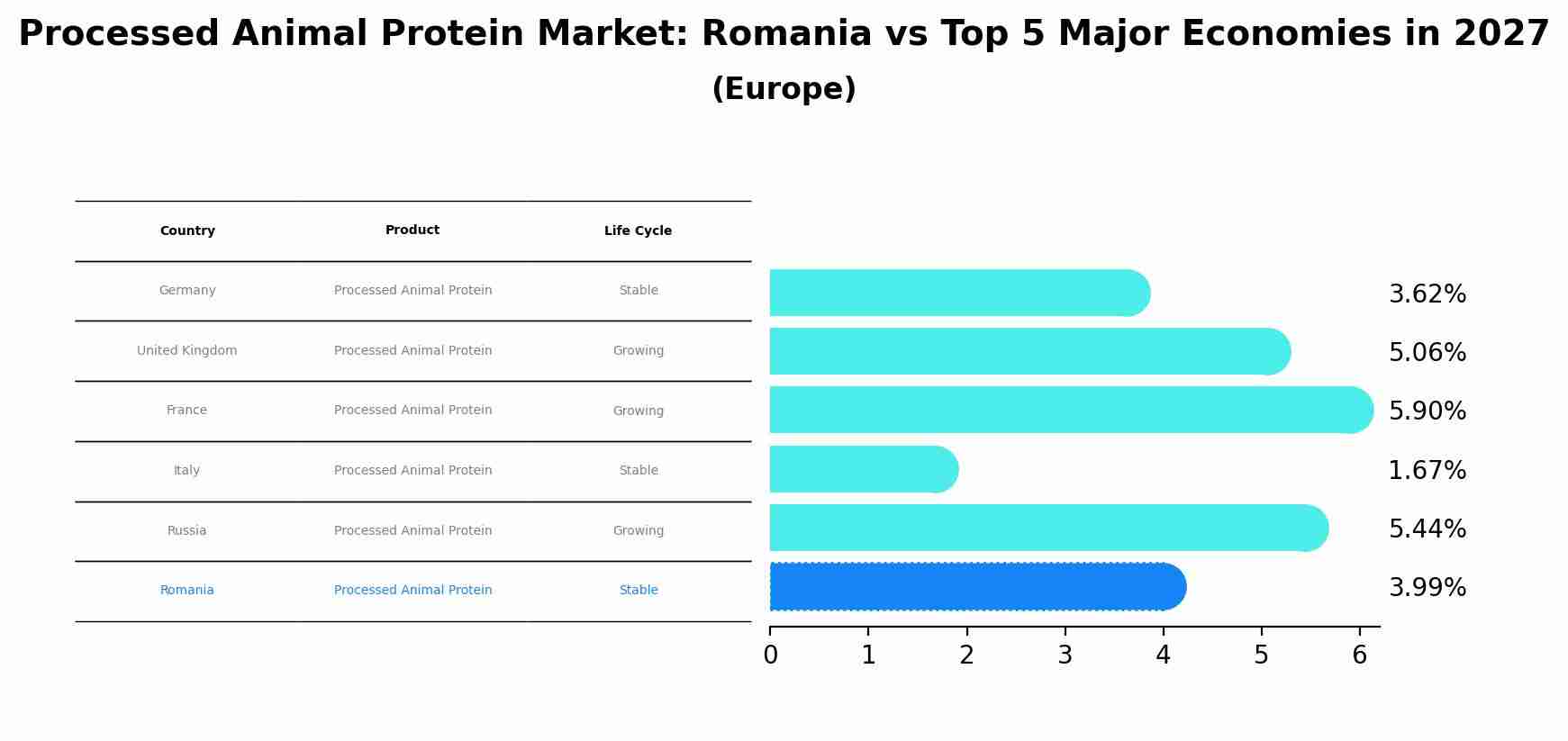Romania Processed Animal Protein Market Outlook | Value, Revenue, Industry, Size, Analysis, COVID-19 IMPACT, Forecast, Companies, Trends, Growth & Share
| Product Code: ETC411914 | Publication Date: Oct 2022 | Updated Date: Jul 2025 | Product Type: Market Research Report | |
| Publisher: 6Wresearch | Author: Vasudha | No. of Pages: 75 | No. of Figures: 35 | No. of Tables: 20 |
Romania Processed Animal Protein Market Size Growth Rate
The Romania Processed Animal Protein Market is projected to witness mixed growth rate patterns during 2025 to 2029. From 4.57% in 2025, the growth rate steadily ascends to 13.17% in 2029.

Processed Animal Protein Market: Romania vs Top 5 Major Economies in 2027 (Europe)
The Processed Animal Protein market in Romania is projected to grow at a stable growth rate of 3.99% by 2027, within the Europe region led by Germany, along with other countries like United Kingdom, France, Italy and Russia, collectively shaping a dynamic and evolving market environment driven by innovation and increasing adoption of emerging technologies.

Romania Processed Animal Protein Market Synopsis
The Romania Processed Animal Protein Market is experiencing steady growth driven by increasing consumer demand for protein-rich food products, particularly in the animal feed sector. The market is characterized by a wide range of products including meat meal, bone meal, blood meal, and feather meal, which are used as essential ingredients in livestock and pet feed formulations. The rising awareness about the nutritional benefits of processed animal protein, along with the emphasis on animal health and productivity, is fueling market expansion. Key players in the industry are focusing on product innovation and quality enhancement to cater to the evolving needs of the agricultural sector. Moreover, stringent regulations regarding the use of animal-based protein sources in feed production are influencing market dynamics, prompting companies to adopt sustainable practices and adhere to industry standards.
Romania Processed Animal Protein Market Trends
The processed animal protein market in Romania is experiencing several key trends. One notable trend is the increasing demand for high-quality and sustainable animal protein products. Consumers are becoming more conscious of the source and production methods of processed animal protein, leading to a growing preference for organic and ethically sourced products. Another trend is the rising popularity of alternative protein sources, such as plant-based and insect-based proteins, driven by health and environmental concerns. Additionally, technological advancements in processing techniques are enhancing the quality and variety of processed animal protein products available in the market. Overall, these trends indicate a shift towards more diverse and sustainable options in the Romania processed animal protein market.
Romania Processed Animal Protein Market Challenges
In the Romania Processed Animal Protein Market, several challenges are being faced. One major challenge is the increasing competition from imported processed animal proteins, which often come at lower prices due to economies of scale in larger markets. This can put pressure on local producers to lower their prices or improve their efficiency to remain competitive. Another challenge is the strict regulations and standards imposed by the EU on the quality and safety of processed animal proteins, requiring significant investments in infrastructure and technology to comply. Additionally, fluctuations in raw material prices and consumer preferences towards more sustainable and ethically sourced products also pose challenges for companies operating in the Romania processed animal protein market. Overall, navigating these challenges requires strategic planning, innovation, and a deep understanding of market dynamics.
Romania Processed Animal Protein Market Investment Opportunities
In the Romania Processed Animal Protein Market, there are several investment opportunities available for potential investors. One key opportunity lies in the growing demand for high-quality processed animal proteins, including meat products, dairy, and seafood. With an increasing focus on convenience and nutrition, there is a rising trend towards value-added processed animal protein products in the Romanian market. Additionally, investing in advanced processing technologies and equipment can help companies improve efficiency and product quality, enhancing their competitiveness in the market. Furthermore, exploring opportunities for export to other European countries can also be a lucrative strategy for investors looking to expand their market reach and capitalize on the region`s growing demand for processed animal protein products. Overall, the Romania Processed Animal Protein Market presents promising investment prospects for those looking to capitalize on the evolving consumer preferences and market trends in the industry.
Jordan Agar Market Government Policies
In Romania, the processed animal protein market is governed by regulations set by the European Union, particularly regarding food safety and animal by-products. The EU Regulation (EC) No 1069/2009 and its subsequent amendments lay down rules for the production, handling, and use of animal by-products, including processed animal proteins. This regulation aims to ensure the safe disposal and utilization of animal by-products to prevent risks to animal and human health. Additionally, Romania has its own national legislation that aligns with EU regulations to regulate the quality and safety standards of processed animal proteins in the market. Compliance with these regulations is crucial for businesses operating in the processed animal protein sector in Romania to maintain high standards of food safety and quality.
Romania Processed Animal Protein Market Future Outlook
The future outlook for the Romania Processed Animal Protein Market appears promising, driven by factors such as the increasing demand for high-protein animal feed in the agriculture sector, growing awareness about the nutritional benefits of processed animal protein, and rising consumer preference for convenience foods. Additionally, the government`s focus on promoting sustainable agriculture practices and investment in the food processing industry are likely to bolster market growth. However, challenges such as fluctuating raw material prices and stringent regulations related to food safety and quality control may hinder the market expansion. Overall, with evolving consumer preferences and technological advancements in food processing, the Romania Processed Animal Protein Market is expected to witness steady growth in the coming years.
Key Highlights of the Report:
- Romania Processed Animal Protein Market Outlook
- Market Size of Romania Processed Animal Protein Market, 2021
- Forecast of Romania Processed Animal Protein Market, 2031
- Historical Data and Forecast of Romania Processed Animal Protein Revenues & Volume for the Period 2018 - 2031
- Romania Processed Animal Protein Market Trend Evolution
- Romania Processed Animal Protein Market Drivers and Challenges
- Romania Processed Animal Protein Price Trends
- Romania Processed Animal Protein Porter's Five Forces
- Romania Processed Animal Protein Industry Life Cycle
- Historical Data and Forecast of Romania Processed Animal Protein Market Revenues & Volume By Source for the Period 2018 - 2031
- Historical Data and Forecast of Romania Processed Animal Protein Market Revenues & Volume By Poultry for the Period 2018 - 2031
- Historical Data and Forecast of Romania Processed Animal Protein Market Revenues & Volume By Pork for the Period 2018 - 2031
- Historical Data and Forecast of Romania Processed Animal Protein Market Revenues & Volume By Beef for the Period 2018 - 2031
- Historical Data and Forecast of Romania Processed Animal Protein Market Revenues & Volume By Others for the Period 2018 - 2031
- Historical Data and Forecast of Romania Processed Animal Protein Market Revenues & Volume By Form for the Period 2018 - 2031
- Historical Data and Forecast of Romania Processed Animal Protein Market Revenues & Volume By Dry for the Period 2018 - 2031
- Historical Data and Forecast of Romania Processed Animal Protein Market Revenues & Volume By Liquid for the Period 2018 - 2031
- Romania Processed Animal Protein Import Export Trade Statistics
- Market Opportunity Assessment By Source
- Market Opportunity Assessment By Form
- Romania Processed Animal Protein Top Companies Market Share
- Romania Processed Animal Protein Competitive Benchmarking By Technical and Operational Parameters
- Romania Processed Animal Protein Company Profiles
- Romania Processed Animal Protein Key Strategic Recommendations
Frequently Asked Questions About the Market Study (FAQs):
- Single User License$ 1,995
- Department License$ 2,400
- Site License$ 3,120
- Global License$ 3,795
Search
Related Reports
- Vietnam System Integrator Market (2025-2031) | Size, Companies, Analysis, Industry, Value, Forecast, Growth, Trends, Revenue & Share
- ASEAN and Thailand Brain Health Supplements Market (2025-2031) | Strategy, Consumer Insights, Analysis, Investment Trends, Opportunities, Growth, Size, Share, Industry, Revenue, Segments, Value, Segmentation, Supply, Forecast, Restraints, Outlook, Competition, Drivers, Trends, Demand, Pricing Analysis, Competitive, Strategic Insights, Companies, Challenges
- ASEAN Bearings Market (2025-2031) | Strategy, Consumer Insights, Analysis, Investment Trends, Opportunities, Growth, Size, Share, Industry, Revenue, Segments, Value, Segmentation, Supply, Forecast, Restraints, Outlook, Competition, Drivers, Trends, Demand, Pricing Analysis, Competitive, Strategic Insights, Companies, Challenges
- Europe Flooring Market (2025-2031) | Outlook, Share, Industry, Trends, Forecast, Companies, Revenue, Size, Analysis, Growth & Value
- Saudi Arabia Manlift Market (2025-2031) | Outlook, Size, Growth, Trends, Companies, Industry, Revenue, Value, Share, Forecast & Analysis
- Uganda Excavator, Crane, and Wheel Loaders Market (2025-2031) | Strategy, Consumer Insights, Analysis, Investment Trends, Opportunities, Growth, Size, Share, Industry, Revenue, Segments, Value, Segmentation, Supply, Forecast, Restraints, Outlook, Competition, Drivers, Trends, Demand, Pricing Analysis, Competitive, Strategic Insights, Companies, Challenges
- Rwanda Excavator, Crane, and Wheel Loaders Market (2025-2031) | Strategy, Consumer Insights, Analysis, Investment Trends, Opportunities, Growth, Size, Share, Industry, Revenue, Segments, Value, Segmentation, Supply, Forecast, Restraints, Outlook, Competition, Drivers, Trends, Demand, Pricing Analysis, Competitive, Strategic Insights, Companies, Challenges
- Kenya Excavator, Crane, and Wheel Loaders Market (2025-2031) | Strategy, Consumer Insights, Analysis, Investment Trends, Opportunities, Growth, Size, Share, Industry, Revenue, Segments, Value, Segmentation, Supply, Forecast, Restraints, Outlook, Competition, Drivers, Trends, Demand, Pricing Analysis, Competitive, Strategic Insights, Companies, Challenges
- Angola Excavator, Crane, and Wheel Loaders Market (2025-2031) | Strategy, Consumer Insights, Analysis, Investment Trends, Opportunities, Growth, Size, Share, Industry, Revenue, Segments, Value, Segmentation, Supply, Forecast, Restraints, Outlook, Competition, Drivers, Trends, Demand, Pricing Analysis, Competitive, Strategic Insights, Companies, Challenges
- Israel Intelligent Transport System Market (2025-2031) | Strategy, Consumer Insights, Analysis, Investment Trends, Opportunities, Growth, Size, Share, Industry, Revenue, Segments, Value, Segmentation, Supply, Forecast, Restraints, Outlook, Competition, Drivers, Trends, Demand, Pricing Analysis, Competitive, Strategic Insights, Companies, Challenges
Industry Events and Analyst Meet
Our Clients
Whitepaper
- Middle East & Africa Commercial Security Market Click here to view more.
- Middle East & Africa Fire Safety Systems & Equipment Market Click here to view more.
- GCC Drone Market Click here to view more.
- Middle East Lighting Fixture Market Click here to view more.
- GCC Physical & Perimeter Security Market Click here to view more.
6WResearch In News
- Doha a strategic location for EV manufacturing hub: IPA Qatar
- Demand for luxury TVs surging in the GCC, says Samsung
- Empowering Growth: The Thriving Journey of Bangladesh’s Cable Industry
- Demand for luxury TVs surging in the GCC, says Samsung
- Video call with a traditional healer? Once unthinkable, it’s now common in South Africa
- Intelligent Buildings To Smooth GCC’s Path To Net Zero













